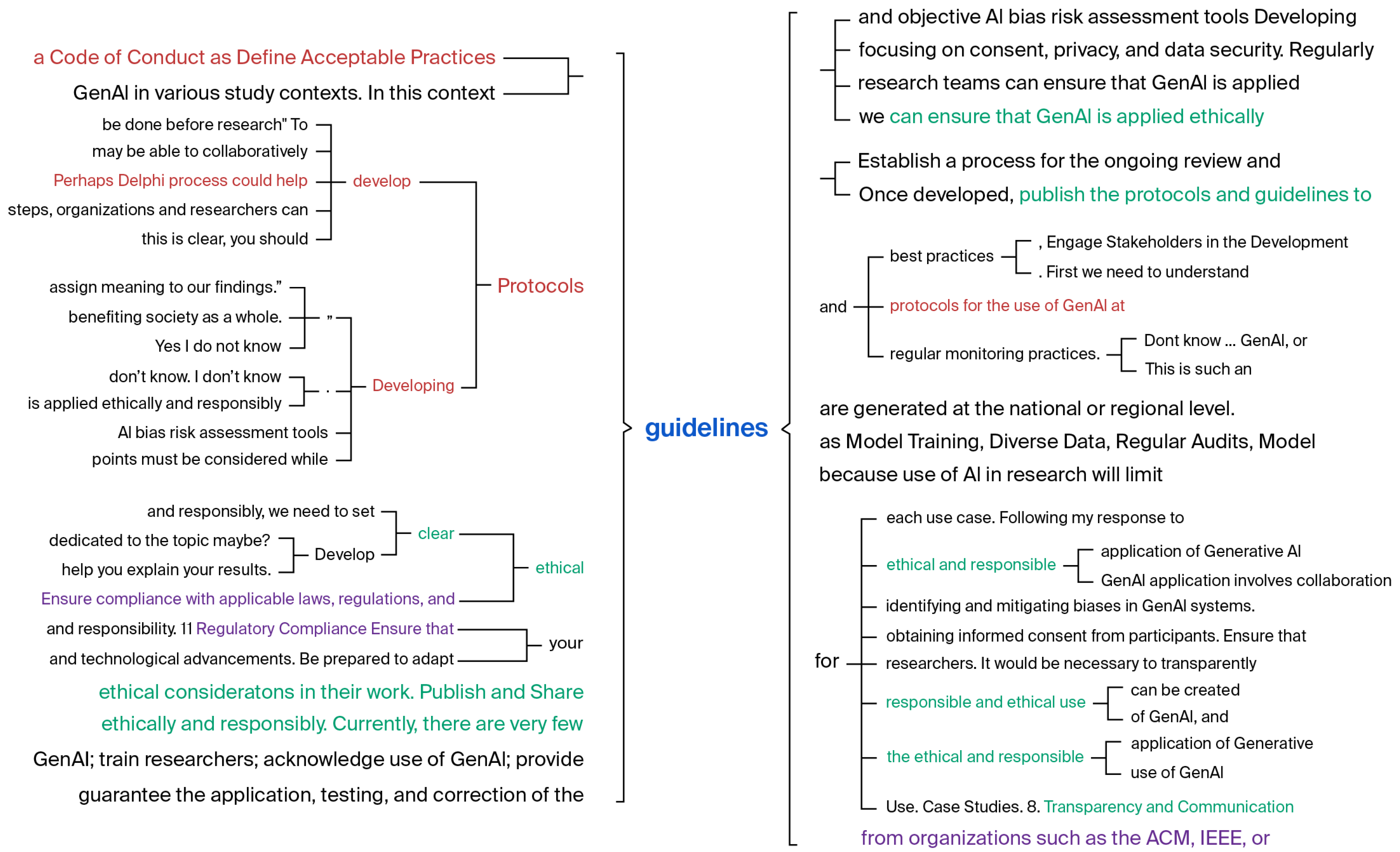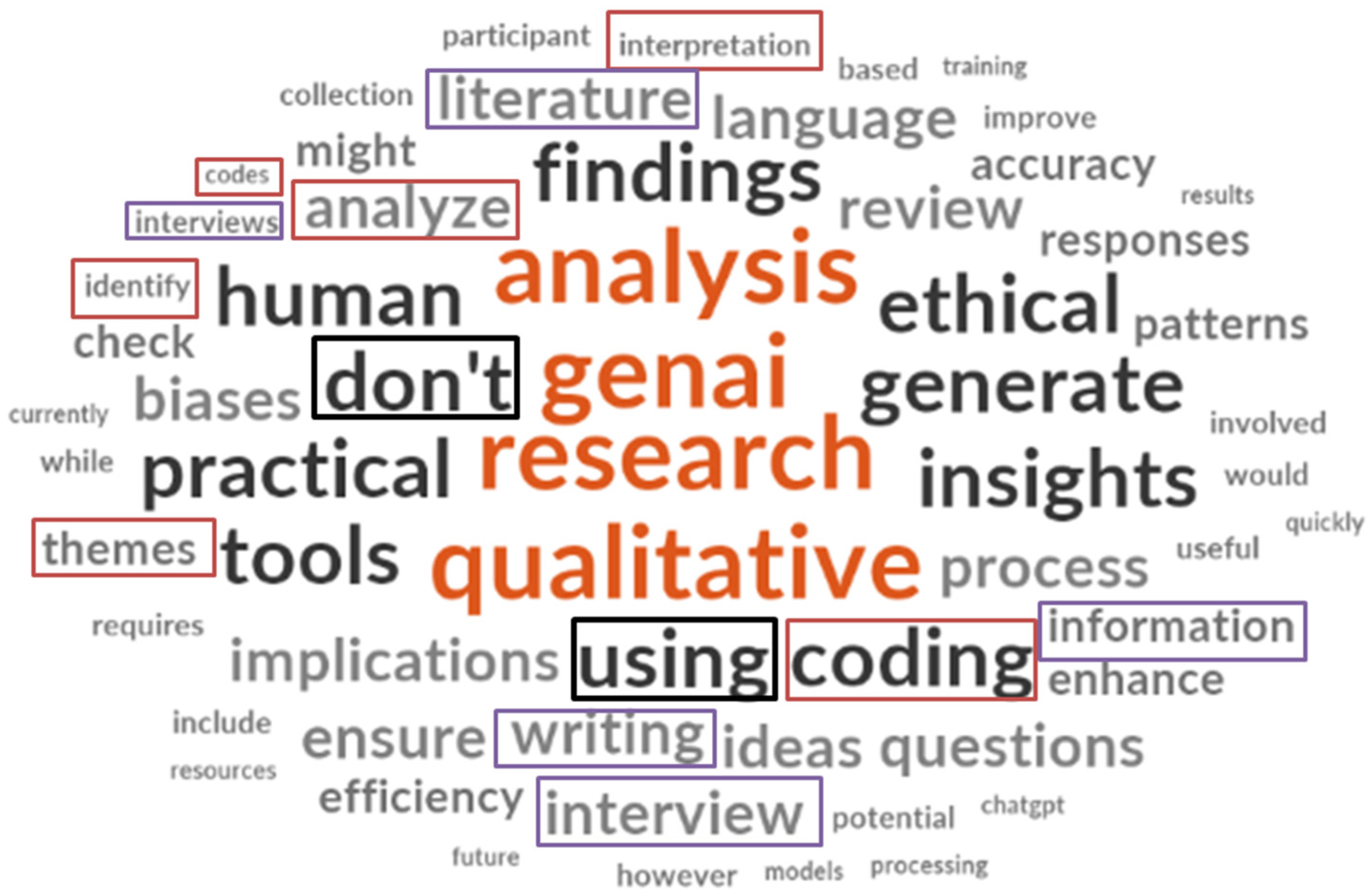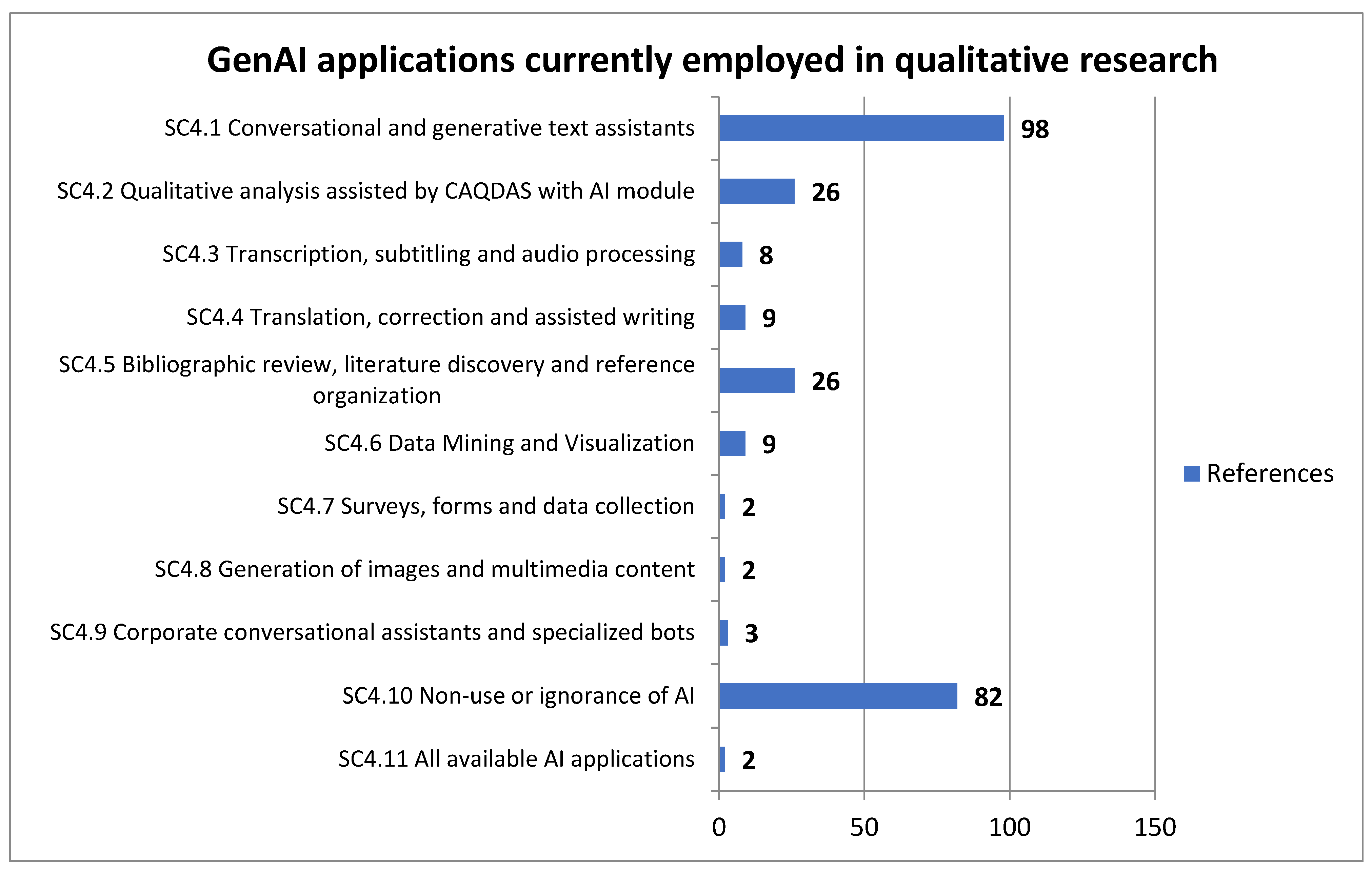Voices of Researchers: Ethics and Artificial Intelligence in Qualitative Inquiry
Abstract
1. Introduction
2. Theoretical Framework
2.1. The Role of GenAI in Contemporary Qualitative Research
2.2. Ethical Foundations in Qualitative Research in the Face of the Advance of GenAI
2.3. Researcher Perceptions and Emerging Regulatory Frameworks
3. Materials and Methods
3.1. Design
3.2. Participants and Setting
3.3. Data Collection
3.4. Data Analysis
4. Results
4.1. Ethical Implications of GenAI in Qualitative Research
4.2. Protocols and Guidelines to Ensure the Ethical Use of GenAI in Qualitative Research
4.3. Practical Uses and Implications of GenAI in Qualitative Research
4.4. GenAI Applications Currently Employed in Qualitative Research
4.5. Barriers to the Adoption of GenAI in Qualitative Research
5. Discussion
6. Conclusions
Author Contributions
Funding
Institutional Review Board Statement
Informed Consent Statement
Data Availability Statement
Acknowledgments
Conflicts of Interest
Abbreviations
| GenAI | Generative Artificial Intelligence |
| AI | Artificial Intelligence |
| GAN | Generative Adversarial Networks |
| GDPR | General Data Protection Regulation |
| UNESCO | United Nations Educational, Scientific and Cultural Organization |
| APA | American Psychological Association |
| C | Category |
| SC | Subcategory |
| CAQDAS | Computer-Assisted Qualitative Data Analysis Software |
| ACM | Association for Computing Machinery |
| IEEE | Institute of Electrical and Electronics Engineers |
Appendix A
| Category | Subcategory |
|---|---|
| C1. Ethical implications of GenAI in qualitative research | SC1.1 Algorithmic Bias SC1.2 Declaration of GenAI Use and Integration SC1.3 Recognizing and Mitigating Patterns of Exclusion or Inaccurate Representations SC1.4 Data Truth, Rigor, and Risk of Falsification SC1.5 Loss of the Human Component and Empathy as an Inherent Risk |
| C2. Protocols and guidelines to ensure the ethical use of GenAI in qualitative research | SC2.1 Need to establish clear regulatory frameworks governing the use of GenAI SC2.2 Ethical principles and researcher transparency SC2.3 Human oversight and process control SC2.4 Creation of ethics committees and interdisciplinary collaboration SC2.5 AI training and literacy SC2.6 Data protection, privacy, and bias mitigation SC2.7 Not knowing or feeling prepared to propose specific protocols or guidelines |
| C3. Practical uses and implications of GenAI in qualitative research | SC3.1 Does not use GenAI in qualitative research, either individually or as a team SC3.2 Initial phase of GenAI experimentation in qualitative research SC3.3 Support for routine tasks that are time-consuming but do not require interpretive judgment (transcription, translation, review and summarization of texts, etc.) SC3.4 Data organization and mining SC3.5 Literature review SC3.6 Tasks related to content analysis (generating codes, identifying themes, or creating groupings or clusters) SC3.7 Preparation of intermediate or final products (writing summaries or structuring reports) SC3.8 Technological integration of GenAI into CAQDAS (Atlas.ti version 25, NVivo version 15, or MAXQDA version 24.4) SC3.9 Creation of documentation (questionnaires or dossiers for ethics committees) SC3.10 Critical points in the analysis of qualitative data with GenAI (quality, bias, authenticity, or need for human supervision) |
| C4. GenAI applications currently employed in qualitative research | SC4.1 Conversational and generative text assistants (ChatGPT version 5, Claude version Opus 4.1, Gemini version 2.0 Flash Thinking, Google Bard, Jasper version 9.0.1, JenniAI, Copilot version 22H2, MetaAI, AIWriter version 1.1.6, AIAssistant version 8, ScholarGPT, Bing version 31.4.2110003555) SC4.2 Qualitative analysis assisted by CAQDAS with AI module (Atlas.ti version 25, NVivo version 15, MAXQDA version 24.4, Quirkos version 3.0, Leximancer version 4.5) SC4.3 Transcription, subtitling and audio processing (Amberscript, Cockatoo version 3.6.5, OtterAI ersion 3.7.0, Trint, SpeechLogger version 0.16, Julius version 4.3.1, Kahubi) SC4.4 Translation, correction and assisted writing (Deepl version 25.42, Grammarly version 1.2.207, Word traductor included in Office 365 package) SC4.5 Bibliographic review, literature discovery and reference organization (Connected Papers, Consensus version 3.1, Elicit version 1.1.7, Research Rabbit, SciteAI version 1.37.0, Scispace version 9.8, Scholarcy version 5.3.0, Mendeley version 1.19.5, Zotero version 7, NotebookLM version 2025.10.14.820451664, Pinpoint version 0.1.9, Perplexity iOS app v2.251016.0) SC4.6 Data Mining and Visualization (PowerBI version 2.148.878.0, Tableau version 2025.1.1, D3.js version 7.8.5, Matlab version R2025b, KNIME version 5.8, RapidMiner version 2025.1, Alteryx version 2025.1.2.79, MonkeyLearn, Lexalytics) SC4.7 Surveys, forms and data collection (Qualtrics version 3.2.1, SurveyMonkey version 4.5.5) SC4.8 Generation of images and multimedia content (DALL·E version 3, Midjourney version 7) SC4.9 Corporate conversational assistants and specialized bots (IBM Watson Assistant 5.1.1, Microsoft Azure Bot Service version 4, ChatbaseAI) SC4.10 Non-use or ignorance of AI SC4.11 All available AI applications |
| C5. Barriers to the adoption of GenAI in qualitative research | SC5.1 Epistemological and methodological barriers SC5.2 Ethical barriers SC5.3 Technical and resource accessibility barriers SC5.4 Cultural resistance to change and attachment to traditional approaches in qualitative research SC5.5 Training and digital literacy barriers SC5.6 Barriers to validity and interpretation of results |
References
- Ngozwana, N. Ethical Dilemmas in Qualitative Research Methodology: Researcher’s Reflections. Int. J. Educ. Methodol. 2018, 4, 19–28. [Google Scholar] [CrossRef]
- Salvaris, M.; Dean, D.; Tok, W.H. Generative Adversarial Networks. In Deep Learning with Azure: Building and Deploying Artificial Intelligence Solutions on the Microsoft AI Platform; Salvaris, M., Dean, D., Tok, W.H., Eds.; Apress: Berkeley, CA, USA, 2018; pp. 187–208. [Google Scholar] [CrossRef]
- van der Zant, T.; Kouw, M.; Schomaker, L. Generative Artificial Intelligence. In Philosophy and Theory of Artificial Intelligence; Müller, V.C., Ed.; Springer: Berlin/Heidelberg, Germany, 2013; pp. 107–120. [Google Scholar] [CrossRef]
- Griffith, T.W. A Computational Theory of Generative Modeling in Scientific Reasoning. Ph.D. Thesis, Georgia Institute of Technology, Atlanta, GA, USA, 1999. [Google Scholar]
- Yépez-Reyes, V.; Cruz-Silva, J. Inteligencia artificial en la transcripción de entrevistas. Contratexto 2024, 183–202. [Google Scholar] [CrossRef]
- Tai, R.H.; Bentley, L.R.; Xia, X.; Sitt, J.M.; Fankhauser, S.C.; Chicas-Mosier, A.M.; Monteith, B.G. An Examination of the Use of Large Language Models to Aid Analysis of Textual Data. Int. J. Qual. Methods 2004, 23, 16094069241231168. [Google Scholar] [CrossRef]
- dos Anjos, J.R.; de Souza, M.G.; de Andrade Neto, A.S.; de Souza, B.C. An analysis of the generative AI use as analyst in qualitative research in science education. Rev. Pesqui. Qual. 2024, 12, 1–29. [Google Scholar] [CrossRef]
- Gamboa, A.J.P.; Díaz-Guerra, D.D. Artificial Intelligence for the development of qualitative studies. LatIA 2023, 1, 4. [Google Scholar] [CrossRef]
- Owoahene Acheampong, K.; Nyaaba, M. Review of Qualitative Research in the Era of Generative Artificial Intelligence. SSRN Electron. J. 2024. [Google Scholar] [CrossRef]
- Dahal, N. How Can Generative AI (GenAI) Enhance or Hinder Qualitative Studies? A Critical Appraisal from South Asia, Nepal. Qual. Rep. 2024, 29, 722–733. [Google Scholar] [CrossRef]
- Chiu, T.K.F. Future research recommendations for transforming higher education with generative AI. Comput. Educ. Artif. Intell. 2024, 6, 100197. [Google Scholar] [CrossRef]
- Davison, R.M.; Chughtai, H.; Nielsen, P.; Marabelli, M.; Iannacci, F.; van Offenbeek, M.; Tarafdar, M.; Trenz, M.; Techatassanasoontorn, A.A.; Díaz Andrade, A.; et al. The ethics of using generative AI for qualitative data analysis. Inf. Syst. J. 2024, 34, 1433–1439. [Google Scholar] [CrossRef]
- Ferrara, E. GenAI against humanity: Nefarious applications of generative artificial intelligence and large language models. J. Comput. Soc. Sc. 2024, 7, 549–569. [Google Scholar] [CrossRef]
- Al-kfairy, M.; Mustafa, D.; Kshetri, N.; Insiew, M.; Alfandi, O. Ethical Challenges and Solutions of Generative AI: An Interdisciplinary Perspective. Informatics 2024, 11, 58. [Google Scholar] [CrossRef]
- Bale, A.S.; Dhumale, R.B.; Beri, N.; Lourens, M.; Varma, R.A.; Kumar, V.; Sanamdikar, S.; Savadatti, M.B. The Impact of Generative Content on Individuals Privacy and Ethical Concerns. Int. J. Intell. Syst. Appl. Eng. 2024, 12, 697–703. [Google Scholar]
- Zohny, H.; McMillan, J.; King, M. Ethics of generative AI. J. Med. Ethics 2023, 49, 79–80. [Google Scholar] [CrossRef] [PubMed]
- Chichande, X.S.F.; Gallardo, N.M.M.; Márquez, T.B.M.; Rodriguez, M.C.T. La etica en la inteligencia artificial desafíos y oportunidades para la sociedad moderna. Sage Sphere Int. J. 2024, 1, 1–24. Available online: https://sagespherejournal.com/index.php/SSIJ/article/view/1 (accessed on 8 August 2025).
- Tal, A.; Elyoseph, Z.; Haber, Y.; Angert, T.; Gur, T.; Simon, T.; Asman, O. The Artificial Third: Utilizing ChatGPT in Mental Health. Am. J. Bioeth. 2023, 23, 74–77. [Google Scholar] [CrossRef] [PubMed]
- Kumar, D.; Dhalwal, R.; Chaudhary, A. Exploring the Ethical Implications of Generative AI in Healthcare. In The Ethical Frontier of AI and Data Analysis; IGI Global Scientific Publishing: Palmdale, PA, USA, 2024; pp. 180–195. [Google Scholar] [CrossRef]
- Piedra-Castro, W.I.; Cajamarca-Correa, M.A.; Burbano-Buñay, E.S.; Moreira-Alcívar, E.F. Integración de la inteligencia artificial en la enseñanza de las Ciencias Sociales en la educación superior. J. Econ. Soc. Sci. Res. 2024, 4, 105–126. [Google Scholar] [CrossRef]
- Nguyen-Trung, K. ChatGPT in thematic analysis: Can AI become a research assistant in qualitative research? Qual. Quant. 2025. [Google Scholar] [CrossRef]
- Adarkwah, M.A. GenAI-Infused Adult Learning in the Digital Era: A Conceptual Framework for Higher Education. Adult Learn. 2025, 36, 149–161. [Google Scholar] [CrossRef]
- Islam, G.; Greenwood, M. Generative Artificial Intelligence as Hypercommons: Ethics of Authorship and Ownership. J. Bus. Ethics 2024, 192, 659–663. [Google Scholar] [CrossRef]
- Cabanillas-García, J.L. International Trends and Influencing Factors in the Integration of Artificial Intelligence in Education with the Application of Qualitative Methods. Informatics 2025, 12, 61. [Google Scholar] [CrossRef]
- Andersen, J.P.; Degn, L.; Fishberg, R.; Graversen, E.K.; Horbach, S.P.J.M.; Schmidt, E.K.; Schneider, J.W.; Sørensen, M.P. Generative Artificial Intelligence (GenAI) in the research process—A survey of researchers’ practices and perceptions. Technol. Soc. 2025, 81, 102813. [Google Scholar] [CrossRef]
- Yan, L.; Echeverria, V.; Fernandez-Nieto, G.M.; Jin, Y.; Swiecki, Z.; Zhao, L.; Gašević, D.; Martinez-Maldonado, R. Human-AI Collaboration in Thematic Analysis Using ChatGPT: A User Study and Design Recommendations. In Extended Abstracts of the CHI Conference on Human Factors in Computing Systems, in CHI EA ’24; Association for Computing Machinery: New York, NY, USA, 2024; pp. 1–7. [Google Scholar] [CrossRef]
- Kang, R.; Xuan, Z.; Tong, L.; Wang, Y.; Jin, S.; Xiao, Q. Nurse Researchers’ Experiences and Perceptions of Generative AI: Qualitative Semistructured Interview Study. J. Med. Internet Res. 2025, 27, e65523. [Google Scholar] [CrossRef] [PubMed]
- Herrera, J.D. La Comprensión de lo Social: Horizontes Hermenéutico de las Ciencias Sociales; Universidad de los Andes: Bogotá, Colombia, 2023. [Google Scholar]
- Ning, Y.; Teixayavong, S.; Shang, Y.; Savulescu, J.; Nagaraj, V.; Miao, D.; Mertens, M.; Ting, D.S.W.; Ong, J.C.L.; Liu, M.; et al. Generative artificial intelligence and ethical considerations in health care: A scoping review and ethics checklist. Lancet Digit. Health 2024, 6, e848–e856. [Google Scholar] [CrossRef] [PubMed]
- Saz-Pérez, F.; Pizà-Mir, B. Necesidades y perspectivas de la integración de la inteligencia artificial generativa en el contexto educativo español. UTE. Teach. Technol. Univ. Tarracon. 2024, 2. Available online: https://raco.cat/index.php/UTE/article/view/429956 (accessed on 8 August 2025).
- Pereira, R.; Reis, I.W.; Ulbricht, V.; Santos, N. dos Generative artificial intelligence and academic writing: An analysis of the perceptions of researchers in training. Manag. Res. J. Iberoam. Acad. Manag. 2024, 22, 429–450. [Google Scholar] [CrossRef]
- Fawaz, M.; El-Malti, W.; Alreshidi, S.M.; Kavuran, E. Exploring Health Sciences Students’ Perspectives on Using Generative Artificial Intelligence in Higher Education: A Qualitative Study. Nurs. Health Sci. 2025, 27, e70030. [Google Scholar] [CrossRef]
- de la Fuente Tambo, D.; Moreno, S.I.; Ruiz, M.A. Barriers and Enablers for Generative Artificial Intelligence in Clinical Psychology: A Qualitative Study Based on the COM-B and Theoretical Domains Framework (TDF) Models. Res. Sq. 2024, 1–20. [Google Scholar] [CrossRef]
- APA Journals Policy on Generative AI: Additional Guidance. Available online: https://www.apa.org/pubs/journals/resources/publishing-tips/policy-generative-ai (accessed on 8 August 2025).
- Rivera, L.C.; Mamani, I.P.; Chalco, J.R.M.; Jáuregui, C.A.G.; Castillo, N.S.C. Ética en el uso de la Inteligencia Artificial en la Investigación Científica: Desafíos y consideraciones. Aula Virtual 2024, 5, 1488–1509. [Google Scholar] [CrossRef]
- Sánchez-Gómez, M.C.; Cabanillas-Garcia, J.L.; Verdugo-Castro, S. Percepción y experiencias de los estudiantes de la Universidad de Salamanca sobre el ocio y el tiempo libre. Pedagog. Soc. Rev. Interuniv. 2024, 45, 231–255. [Google Scholar] [CrossRef]
- Badil; Muhammad, D.D.M.D.; Aslam, Z.A.Z.; Khan, K.K.K.; Ashiq, A.A.A.; Bibi, U.B.U. The Phenomenology Qualitative Research Inquiry: A Review Paper: Phenomenology Qualitative Research Inquir. Pak. J. Health Sci. 2023, 4, 9–13. [Google Scholar] [CrossRef]
- Emerson, R.W. Convenience Sampling Revisited: Embracing Its Limitations Through Thoughtful Study Design. J. Vis. Impair. Blind. 2021, 115, 76–77. [Google Scholar] [CrossRef]
- Braun, V.; Clarke, V. To saturate or not to saturate? Questioning data saturation as a useful concept for thematic analysis and sample-size rationales. Qual. Res. Sport Exerc. Health 2021, 13, 201–216. [Google Scholar] [CrossRef]
- Zhong, R.; Northrop, J.; Sahota, P.; Glick, H.; Rostain, A. Informed About Informed Consent: A Qualitative Study of Ethics Education. J. Health Ethics 2019, 15, 2. [Google Scholar] [CrossRef]
- Cabanillas-García, J.L. The Application of Active Methodologies in Spain: An Investigation of Teachers’ Use, Perceived Student Acceptance, Attitude, and Training Needs Across Various Educational Levels. Educ. Sci. 2025, 15, 210. [Google Scholar] [CrossRef]
- Braun, V.; Clarke, V. Using thematic analysis in psychology. Qual. Res. Psychol. 2006, 3, 77–101. [Google Scholar] [CrossRef]
- Cabanillas-García, J.L.; Rodríguez-Jiménez, C.J.; Sánchez-Gómez, M.C.; Losada-Vázquez, Á.; Losada-Moncada, M.; Corrales-Vázquez, J.M. Observational Study of Experiential Activities Linked to Astronomy with CAQDAS NVivo. In Computer Supported Qualita-Tive Research; Costa, A.P., Moreira, A., Freitas, F., Costa, K., Bryda, G., Eds.; Springer International Publishing: Cham, Switzerland, 2023; pp. 180–198. [Google Scholar] [CrossRef]
- Brandão, C. P. Bazeley and K. Jackson, Qualitative Data Analysis with NVivo (2nd ed.): (2013). London: Sage. Qual. Res. Psychol. 2015, 12, 492–494. [Google Scholar] [CrossRef]
- Nowell, L.S.; Norris, J.M.; White, D.E.; Moules, N.J. Thematic Analysis: Striving to Meet the Trustworthiness Criteria: Striving to Meet the Trustworthiness Criteria. Int. J. Qual. Methods 2017, 16, 1609406917733847. [Google Scholar] [CrossRef]
- Miao, F.; Holmes, W. Guía Para el Uso de IA Generativa en Educación e Investigación—UNESCO Biblioteca Digital; Unesco: Paris, France, 2024; Available online: https://unesdoc.unesco.org/ark:/48223/pf0000389227 (accessed on 25 March 2025).
- Morgan, D.L. Exploring the Use of Artificial Intelligence for Qualitative Data Analysis: The Case of ChatGPT. Int. J. Qual. Meth. 2023, 22, 16094069231211248. [Google Scholar] [CrossRef]
- Sun, H.; Kim, M.; Kim, S.; Choi, L. A methodological exploration of generative artificial intelligence (AI) for efficient qualitative analysis on hotel guests’ delightful experiences. Int. J. Hosp. Manag. 2025, 124, 103974. [Google Scholar] [CrossRef]
- Li, Z.; Ironsi, C.S. The Efficacy of Generative Artificial Intelligence in Developing Science Education Preservice Teachers’ Writing Skills: An Experimental Approach. J. Sci. Educ. Technol. 2024, 1–12. [Google Scholar] [CrossRef]
- Chatzichristos, G. Qualitative Research in the Era of AI: A Return to Positivism or a New Paradigm? Int. J. Qual. Methods 2025, 24, 16094069251337583. [Google Scholar] [CrossRef]





| Variable | Category | n (%) |
|---|---|---|
| Sex | Male | 120 (56.1) |
| Female | 94 (43.9) | |
| Age | 45.37 ± 12.59 | |
| Experience | 14.01 ± 10.97 | |
| Region | Europe | 89 (41.6) |
| South America | 22 (10.3) | |
| North America | 31 (14.5) | |
| Asia | 41 (19.2) | |
| Africa | 23 (10.7) | |
| Oceania | 8 (3.7) | |
| Area of knowledge | Social and Political Sciences | 94 (43.9) |
| Health Sciences | 73 (34.1) | |
| Engineering and Architecture | 8 (3.7) | |
| Arts and Humanities | 18 (8.4) | |
| Sciences | 21 (9.8) | |
Disclaimer/Publisher’s Note: The statements, opinions and data contained in all publications are solely those of the individual author(s) and contributor(s) and not of MDPI and/or the editor(s). MDPI and/or the editor(s) disclaim responsibility for any injury to people or property resulting from any ideas, methods, instructions or products referred to in the content. |
© 2025 by the authors. Licensee MDPI, Basel, Switzerland. This article is an open access article distributed under the terms and conditions of the Creative Commons Attribution (CC BY) license (https://creativecommons.org/licenses/by/4.0/).
Share and Cite
Cabanillas-García, J.L.; Sánchez-Gómez, M.C.; del Brío-Alonso, I. Voices of Researchers: Ethics and Artificial Intelligence in Qualitative Inquiry. Information 2025, 16, 938. https://doi.org/10.3390/info16110938
Cabanillas-García JL, Sánchez-Gómez MC, del Brío-Alonso I. Voices of Researchers: Ethics and Artificial Intelligence in Qualitative Inquiry. Information. 2025; 16(11):938. https://doi.org/10.3390/info16110938
Chicago/Turabian StyleCabanillas-García, Juan Luis, María Cruz Sánchez-Gómez, and Irene del Brío-Alonso. 2025. "Voices of Researchers: Ethics and Artificial Intelligence in Qualitative Inquiry" Information 16, no. 11: 938. https://doi.org/10.3390/info16110938
APA StyleCabanillas-García, J. L., Sánchez-Gómez, M. C., & del Brío-Alonso, I. (2025). Voices of Researchers: Ethics and Artificial Intelligence in Qualitative Inquiry. Information, 16(11), 938. https://doi.org/10.3390/info16110938









